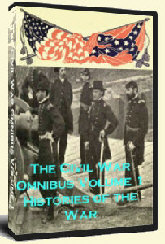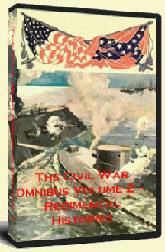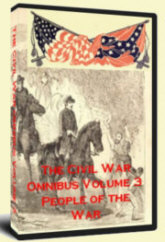When Civil War historian and preservationist Robert Hicks released his book The Widow of the South in 2005, he fictionalized the story of Carrie McGavock, who turned acres of her family’s home, Carnton Plantation, into a cemetery for the Confederate dead after the second Battle of Franklin, Tennessee. A best-seller, Hicks’ novel brought a long-forgotten chapter in the story of the Civil War to a new generation of readers. Hicks’ novel is a work of fiction, but the real story of Carnton Plantation, Carrie McGavock and the cemetery she helmed is just as fascinating.
Carnton Plantation, located at Franklin, Tennessee, was constructed between 1815 and 1826 by former Nashville mayor Randal McGavock. Presidents James Polk and Andrew Jackson were both visitors to Carnton, which McGavock built the plantation on the site of a Revolutionary War land grant belonging to his father. Carnton originally consisted of around 1,420 acres. Read the rest of this entry »
Comments Off on Carnton Plantation and the “Widow of the South” – the True Story, pt. 1
After his election to the presidency, Abraham Lincoln made appointments to his cabinet that perplexed not only his advisors but the entire nation. Of the Republicans he appointed, he chose men who openly disagreed with his policies, who’d supported his opponent, and even a couple who’d run against him for the presidential nomination. Many of these men had their own reasons for wishing to see him fail. Secretary of State William Seward and Secretary of the Treasury Salmon P. Chase, just to name two, both had designs on the White House, but one of his most surprising appointments was that of Edwin Stanton, an appointment that not only crossed party lines, but also put at the helm of the Civil War who’d referred to Lincoln on more than one occasion as “the original gorilla.”
Lincoln’s propensity for keeping his friends close and his enemies closer was obvious, but somehow Stanton, an enemy who was not only a Breckinridge Democrat but loudly critical of Lincoln, somehow missed being included in Lincoln’s initial appointments, despite his apparent qualification. Lincoln’s first appointee to the position of Secretary of War was Simon Cameron, a Pennsylvanian thought to be useful for his political and business ties. However useful Cameron was politically, he was certainly not of the caliber that the position needed during a civil war, and the fact that he would have to be replaced soon became obvious, even to Lincoln, who tended to overlook the faults of others, to a fault. Read the rest of this entry »
Comments Off on Edwin Stanton – Master of War
It is impossible to overstate the importance of cotton to the South during the antebellum period, or its contribution to the chain of events that resulted in the Civil War. As the major export of the South – perhaps the United States – cotton economically supported the South. As a crop that required extensive labor, cotton’s role in the slavery culture that grew in the South loomed large. Understanding the degree to which the South depended upon cotton is key to understanding the role this crop played in a war that divided a nation.
While the South was an agricultural society that produced other crops besides cotton – tobacco in the Upper South, rice in the coastal regions, sugar throughout – no crop was as essential to the economy of the South in the way that cotton was. The demand for cotton was great; not only did the South supply the textile mills of the Northern states in America with cotton – Europe depended heavily on Southern cotton, as well. The powerful nations of England and France relied on Southern cotton for their own textile industries, with Southern cotton accounting for more than three-quarters of the cotton imported into these countries. Read the rest of this entry »
Comments Off on King Cotton – White Gold and the Civil War
The use of “colored troops” during the Civil War was a controversial practice that was debated by both the Union Army and the Confederate Army. Although African-American soldiers existed in the Confederate Army, they were few and far between, but in the Union Army, African-Americans accounted for ten percent of the soldiers who served in the Federal Army.
Around 180,000 African-Americans in 163 units served in the Union Army, and a significant amount of African-Americans served in the Federal Navy. Although many of the African-American soldiers and sailors were freedmen, a large number were also slaves who joined the cause either as runaways, or after being “seized” as contraband, a practice that was standard during the first years of the war.
However, it wasn’t until 1862 that Congress signed off on the use of African-Americans in the U.S. Army and Navy, passing two acts that allowed for the enlistment of African-Americans. While these acts were passed in April, they did not take effect until later in the year, after the Emancipation Proclamation. Read the rest of this entry »
Comments Off on African-American Troops and the Civil War
Next to Longstreet and Jackson, I consider A.P. Hill the best commander with me. He fights his troops well and takes good care of them. Robert E. Lee
While Confederate General A.P Hill was a household name during the Civil War, he is little known nowadays, despite the fact that he was considered among the most important of the Confederacy’s military officers during his time. Valued by both General Robert E. Lee and General Thomas “Stonewall” Jackson, A.P. Hill’s death just before the war’s conclusion was one of the final death blows dealt to the Confederacy.
Ambrose Powell Hill, known as “Little Powell,” was born in Virginia in 1825. A graduate of the United States Military Academy (15th in a class of 38), the slightly-built Hill was appointed after graduation to the U.S. Artillery as a second lieutenant, and went on to serve in both the Mexican-American War and the Seminole War, eventually being promoted to first lieutenant. He married Kitty Morgan McClung, a widow, in 1850, and found among his in-laws future brothers in arms John Hunt Morgan and Basil W. Duke. Read the rest of this entry »
Comments Off on A.P. Hill – Confederate Civil War Commander


